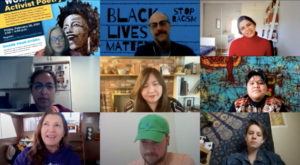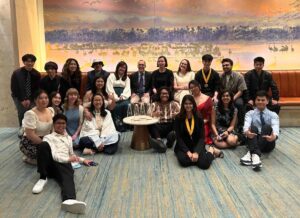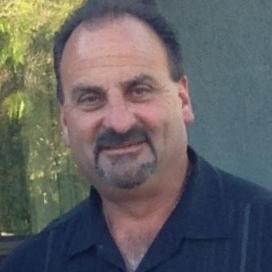 February 26 brought together members of our community for a virtual reading and discussion of poetry as a powerful vehicle for activism and expression during challenging times.
February 26 brought together members of our community for a virtual reading and discussion of poetry as a powerful vehicle for activism and expression during challenging times.
Amanda Gorman’s “The Hill we all Climb”
Led by Poetry Club president and alumna Hilary Cruz Mejia and English faculty members Lucia Lachmayr and Rob Williams, participants began by exploring Gorman’s now famous inaugural poem for the power of its language, imagery, metaphors and symbols. The group concluded, “We all have our own hills but this is one we need to climb together.”
San Mateo County Poet Laureate Aileen Cassinetto also spoke to Gorman’s talent at effectively highlighting the painful event at the Capitol on January 6, 2021 — “we’ve seen a force that will shatter our nation” — and how “that’s what makes being a poet really useful at this time. When you see something that bothers you, a poet can always find its name and then take it out of obscurity and create language around it, and it’s in this cusp that poets make a difference.”
Writing & Sharing Poetry Together
Professor Lachmayr next led the group in an informal poetry exercise around two questions: “What’s one feeling you’re having about a challenge you’re facing?” and “What’s one positive thing you’re looking toward to address that with?” Using answers posted in the Zoom chat she crafted a group poem that participants experienced together, reading aloud.
Participants next read from their own works and works they admired. From Cruz Mejia, two powerful works she’d composed, “Our Silent Pain” and “Nameless Days.” Hebert Rivas Flores read an excerpt from activist Brazilian poet Vinícius de Moraes’ “Sonnet on Infidelity.” Student poet Katherine Alm read courageously from a letter written to her own anxiety as a tool for taming it. Cassinetto read a recent piece she’d crafted for the Fellowship of Reconciliation following the 2020 presidential election. Lachmayr followed with a poem by Williams recently published in From Everywhere a Little: A Migration Anthology. Librarian Pia Walawalkar read a powerful passage from Minal Hajratwala’s Leaving India. Participants discussed the theme of colonialism that many students present had experienced first hand.
How does poetry activate us? Some thoughts shared by participants:
- “The journalists and the poets bring out the truth, tap into our emotions so that we feel like we need to do something about it.”
- “I find poetry as a way to communicate that we are not understanding each other, we need to learn to listen to the words”.
- “Poetry also [allows] you to challenge – however, before you change the world, you must change yourself…”
- “Poetry allows you to feel empowered from other peoples stories, it starts building those connections.”
Upcoming March Events
- The Poetry Clubhas begun meeting Thursdays from 1:00-2:00pm. Students read and write together. Interested? Contact Hilary Cruz Mejia <hilarycruzmejia@my.smccd.edu>
- Join us for Poetry Corner: Empower Women, Empower Earth – Thursday, March 18, 4pm-5:30pm. More information here: https://guides.skylinecollege.edu/LibraryEvents/PoetryEcofeminism
- On Wednesday, March 24, Skyline College Librarian Pia Walawalkar and Hilary Cruz Mejia will be panelists before the San Mateo County Commission on the Status of Women with Aileen Cassinetto. All are welcome to attend. https://csw.smcgov.org/events/future-womens-history-womens-history-month-2021
Special Thanks
The Poetry Corner series is hosted by Skyline College Library and supported by a President’s Innovation Fund award. Special thanks go out to Marisa Thigpen and Pia Walawalkar for organizing Words Changing Worlds: Activist Poetry.
Article by Jessica Silver-Sharp






